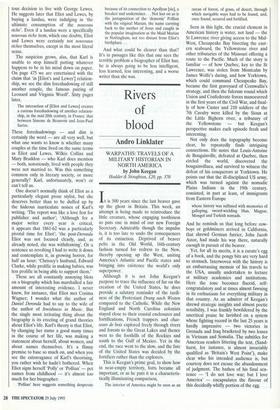Rivers of blood
Andro Linklater
WARPATHS: TRAVELS OF A MILITARY HISTORIAN IN NORTH AMERICA by John Keegan Hodder & Stoughton, £20, pp. 370 It is 500 years since the last beaver gave up the ghost in Britain. This week, an attempt is being made to reintroduce the little creature, whose engaging toothiness so puts one in mind of our new Foreign Secretary. Admirable though the impulse is, it is too late to undo the consequences of its extinction. Deprived of beaver pelts in the Old World, 16th-century fashion turned for redress to the New, thereby opening up the West, uniting America's Atlantic and Pacific states and bringing into existence the world's only superpower.
Although it is not John Keegan's purpose to trace the influence of fur on the creation of the United States, he does provide a salutary reminder of the tardi- ness of the Protestant Drang nach Westen compared to the Catholic. While the New England and North Carolina colonists stayed close to their coastal enclosures and fortifications, French trappers and chas- seurs de bois explored freely through rivers and forests to the Great Lakes and thence west to the foothills of the Rockies and south to the Gulf of Mexico. Yet in the end, the race went to the slow, and the fate of the United States was decided by the fortifiers rather than the explorers.
This is Keegan's prime goal, to show how in near-empty territory, forts became all important, or as he puts it in a characteris- tically illuminating comparison,
The interior of America might be seen as an ocean of forest, of grass, of desert, through which navigable ways had to be found, and, once found, secured and fortified.
Seen in this light, the crucial element in American history is water, not land — the St Lawrence river giving access to the Mid- West, Chesapeake Bay bisecting the east- ern seaboard, the Yellowstone river and other tributaries of the Missouri offering a route to the Pacific. Much of the story is familiar — of how Quebec, key to the St Lawrence, was stolen from Montcalm by James Wolfe's daring, and how Yorktown, which could command Chesapeake Bay, became the first graveyard of Cornwallis's strategy, and then the fulcrum round which Union and Confederate forces manoeuvred in the first years of the Civil War, and final- ly of how Custer and 210 soldiers of the 7th Cavalry were killed by the Sioux at the Little Bighorn river, a tributary of the Yellowstone — but Keegan's perspective makes each episode fresh and interesting.
Not only does the topography become clear, he repeatedly finds intriguing connections. He notes that Louis-Antoine de Bougainville, defeated at Quebec, then circled the world, discovered the bougainvillaea, and survived to witness the defeat of his conquerors at Yorktown. He points out that the ill-disciplined US army, which was turned against the nomadic Plains Indians in the 19th century, consisted, in part at least, of immigrants from Eastern Europe
whose history was suffused with memories of galloping, sword-wielding Hun, Magyar, Mongol and Turkish nomads.
And he reminds us that long before cow- boys or goldminers arrived in California, that shrewd German furrier, John Jacob Astor, had made his way there, naturally enough in pursuit of the beaver.
Yet, for all its merits, it is a curate's egg of a book, and the pongy bits are very hard to stomach. Interwoven with the history is an embarrassing memoir of his travels to the USA, usually undertaken to lecture at military academies and institutions. Here the tone becomes flaccid, self- congratulatory and at times almost fawning in its enthusiasm for everything military in that country. As an admirer of Keegan's shrewd strategic insights and almost poetic sensibility, I was frankly bewildered by the uncritical praise he lavished on a system whose fighting record in the last 25 years is hardly impressive — two victories in Grenada and Iraq bracketed by two losses in Vietnam and Somalia. The subtitles for American readers littering the text, (Sand- hurst, for instance, is almost invariably qualified as 'Britain's West Point'), make clear who his intended audience is, but courtesy does not excuse the abandonment of judgment. The bathos of his final sen- tence — 'I do not love war; but I love America' — encapsulates the flavour of this decidedly whiffy portion of the egg.


















































 Previous page
Previous page